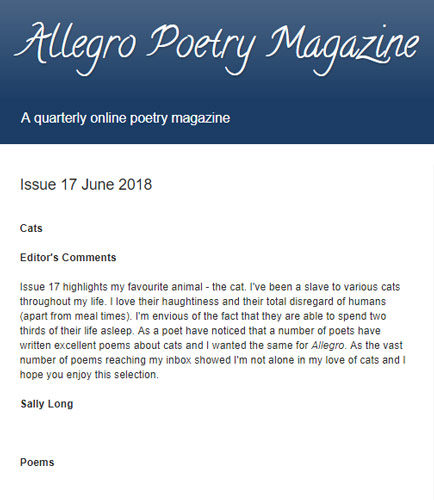Allegro Poetry Magazine – June 2018
Looking back, one of my first introductions to poetry (and enjoying it) was a small set of children’s books, one filled with poetry dedicated to dogs, and the other dedicated to cats. I read them constantly, paging through them until the covers began to curl backward from my incessant touching. I couldn’t help thinking of this set of books when I received the new issue announcement for Allegro Poetry Magazine in my inbox, pleased to see the issue is dedicated to cats. Unable to currently live with any felines myself, the poetry is a nice substitute for a warm cat on the lap.
Looking back, one of my first introductions to poetry (and enjoying it) was a small set of children’s books, one filled with poetry dedicated to dogs, and the other dedicated to cats. I read them constantly, paging through them until the covers began to curl backward from my incessant touching. I couldn’t help thinking of this set of books when I received the new issue announcement for Allegro Poetry Magazine in my inbox, pleased to see the issue is dedicated to cats. Unable to currently live with any cats myself, the poetry is a nice substitute for a warm cat on the lap.
Tributes to past pets, poems written from a feline’s point of view, homages to the species as a whole—it’s all here in the June 2018 issue. Many of the pieces find the speaker in quiet places, like “This Morning” by Ezra Miles, the speaker curled up in bed, asleep, watched over by their cat while the subject of the poem goes on a run during a morning rain. Miles captures the sleepy stillness of a rainy morning, the cat an added, quiet comfort.
Rushika Wick explores the quiet places of a cat’s memory, the speaker seeking to sell them in “Tiny vials of wild”: lonely nights and ones spent curled up in a boy’s bed, the “vernacular of seasons, / crushed leaves and rodent skulls.” This leads the speaker to consider their own memories, how they’re boxed away in their own vials, stale now and refreshed by a “picture or book.” The speaker ends by taking a sip of the cat’s memories which taste like “tastes of taut lungs, / nosebleeds in summer.” The entirety of the poem feels compelling and magical, the faraway and “unreal” quality of old memories coming through in the imagery.
Anne Graue continues the theme of memories in “The Good Old Days,” bringing readers to one beautiful day in the speaker’s memory:
the day we pretended
to drive the red convertible
Austin Healey abandoned behind
the fence,
The speaker shares the carefree joys of childhood in the 70s, of loudly singing along to the record player:
and we danced
on a picnic table in the garage
where Topsy had her kittens,
and we watched them emerge
one by one.
Even though I grew up two decades later, the piece still radiates that golden glow of childhood adventure and freedom, of finding magic in the abandoned and playing music so loudly the sound warps. At one point in my own childhood, a kid in the neighborhood had a cat that was constantly having kittens and I remember dancing along to Now That’s What I Call Music! CDs with her and her sisters, kittens clutched to our chests. Graue’s poem immediately brought those memories back as she shares her own. She has a way of bringing a setting to life, which she also illustrates in her other poem this issue, “Negative Space,” which speaks about the “absence / of the sound of human voices,” a cat there to help fill in the spaces.
Jo Angela Edwins discusses the way poems can affect us with her piece “After Reading a Poem in Which the Speaker Hits a Cat on the Interstate: with apologies to Jeff Worley.” The speaker reads the poem with their own cat on their lap, mind racing as they wonder how much of the poem they’ve just read is fiction. The poem causes her to drink more quickly, to write her own poem, to begin “loving more exquisitely / what tenderness is given in this life.” Edwins writes in a conversational tone, sounding like a friend letting us in on some gossip over a glass of wine, but leaving us with a deeper reminder to love and cherish what you can while you can.
Other pieces that caught my eye this issue was the set of haiku by Joan McNerney. “Haiku Cats – take your pick of the litter” describes five different cats, and it really does feel like you’re picking your favorite from them. In “From out of the night,” Yvonne Baker describes the cat-like characteristics of fear, “its warmth soft as kitten fur,” a cool set of imagery.
For more poems about cats (and for poems about much more than just cats), stop by the Allegro Poetry website. Dog people, don’t worry—you’re still likely to find something here for you too and may just walk away with a greater appreciation for the felines in your life.
[www.allegropoetry.org]






